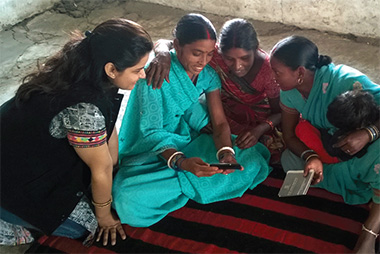In the process of development policy making and program implementation, research helps speed up learning among policy makers and program managers. Research undertaken to fill major knowledge gaps can lead to mid-course correction that can profoundly impact development outcomes. For example, a recent research study undertaken to identify the curriculum gaps for building capacity for making higher education nutrition programs in India implemented more effectively has the potential to positively influence the development program. The major disconnect between food production, which far exceeded self-sufficiency almost 30 years ago, and persistent child malnutrition and hunger has been a major development puzzle. While intervention programs address food access through universal food distribution and social safety net programs, the nutrition impact of these program continues to be negligible due to weak capacity of the frontline professionals who are needed to bridge the agriculture–nutrition disconnect. Recent research published by the World Bank in collaboration with IFPRI traces the fundamental reason of such disconnect to the weak curriculum at universities, which do not provide adequate opportunities for nutritionists to learn agriculture and agriculturists to learn nutrition. Both are needed in order to effectively transform agricultural growth into nutritional outcomes.
Systematic consultation with university officials, policy makers, and program implementers revealed that the gaps in the university curriculum are the root cause of the skill levels of frontline professionals, which in turn is reflected in the quality of work performs. A major learning outcome of these consultations was that asking for results without capacity building in place can result huge waste of resources allocated to nutrition programs. Yet much of development research process neglect such opportunities that can help systematic learning and fixing the critical blockages in delivering development outcomes.
Through systematic client and stakeholder consultations and case studies of three major states in India, this report identifies major constraints, challenges, and lessons for aligning curriculum with the needs of development implementation on the ground. Specific lessons from this research collaboration also are outlined. First, there is an urgent need to integrate nutrition and agriculture curricula to build last-mile capacity for effective implementation of nutrition interventions that depend on and contribute the food systems and vice versa. Agricultural extension reforms that are currently being implemented in developing countries could be a timely opportunity for such integration. In this process of reforms, both the demand of such capacity and the supply of skills could be identified and the university level curricula need modification in order to address such change. Providing incentives to universities and the extension systems to hire professionals with such skills will require strategic approach the nutrition program intervention where individual sectors, such as agriculture, social welfare, and health must come together for planning and executing this integration of curricula. Such curriculum reforms should extend to mid-career professional who are already engaged in the delivery of nutrition programs at district, and local levels. Opening up the professional hiring process for nutritionists and the extension professionals to accommodate each other is essential for such integration and sustaining the nutritional outcomes that could come from this approach.
The results of this research support the recent call for development programs to learn from the implementation of interventions in addition to the use of evidence from the experimentation of approaches to intervention. In the context of such disconnect between agriculture and nutrition, it will be useful to develop curricula that introduce various context specific strategies for mixing agriculture and nutrition content depending on the nutritional problems of various regions. Further, creating adequate space of both academic and implementing organizations to learn from their curriculum strategies and how they affect the performance of the nutrition and agricultural professional delivering intervention programs is critical for sustained improvements in the program implementation.
Reference:
Babu, S.C., M. Singh, T. V. Hymavathi, K. Uma Rani, and G.G. Kavitha Shree Karthik,( 2016) Improved Nutrition Through Agricultural Extension and Advisory Services: Case studies of curriculum review and operational lessons from India. World Bank Group Report Number 94887-IN, The World Bank, International Food Policy Research Institute, and South Asia Food And Nutrition Security Initiative of the World Bank. Washington, D.C.







